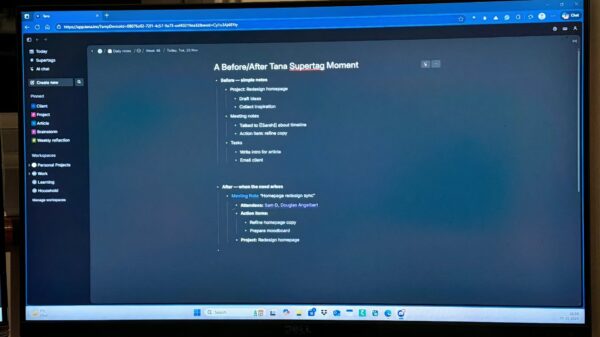Oracle Corporation (NYSE: ORCL) has seen its stock price soar following the release of its latest quarterly earnings, prompting analysts to reassess the company’s valuation. Tyler Radke, co-head of U.S. software equity research at Citi, expressed his views during a recent segment on CNBC, emphasizing that despite the stock’s post-earnings surge, it remains attractively priced.
Radke noted that Oracle’s revenue and earnings per share (EPS) projections for fiscal year 2028 have increased significantly, with expected growth rates between 25% and 30%. He remarked, “The shares are up today almost 40%, yet on a valuation basis, it’s actually not that much more expensive than it was earlier this week.” His analysis suggests that Oracle could achieve consolidated revenue growth approaching 50% in the coming years, a remarkable feat for a company of its scale.
Looking ahead, Radke anticipates exciting developments, particularly with Oracle’s upcoming AI World Conference scheduled for next month in Las Vegas. He believes this event could unveil further surprises regarding the company’s margins and additional contract signings. As Oracle prepares for this conference, the company reported a booked revenue expectation exceeding $0.5 trillion.
Oracle’s business model, which focuses on enterprise databases and ERP software, continues to draw significant interest from large clients, including banks and hospitals. The company’s competitive edge lies in its ability to offer cost-effective cloud services while integrating software as a service (SaaS), ERP, and human capital management (HCM), creating substantial switching costs for customers.
In its second quarter 2025 investor letter, Loomis Sayles Growth Fund highlighted Oracle’s leadership in the enterprise software market. The letter stated, “Oracle Corporation is a leader in the enterprise software market with a strong market position in database, infrastructure and application software, and cloud-based software and services.” This robust position is reinforced by a large and experienced direct sales force and a management team committed to maintaining a leading intellectual property portfolio.
Oracle’s recent financial performance exceeded both management expectations and consensus forecasts, particularly in the area of remaining performance obligation (RPO) bookings. The company has raised its guidance for the fiscal year 2026, now projecting at least 16% revenue growth, driven by cloud segments expected to grow by more than 40%. As Oracle transitions from a traditional software licensing model to a subscription-based cloud model, it has encountered year-over-year revenue pressures. However, this shift is anticipated to facilitate faster growth in the long term, enhancing customer lifetime value.
While some analysts acknowledge the risks associated with investing in Oracle, they maintain a positive outlook based on the company’s fundamentals. The potential for growth in the AI sector remains a focal point, with some investment reports suggesting that certain AI stocks may offer higher returns within a shorter timeframe.
In summary, Oracle’s recent performance and strategic positioning within the enterprise software market suggest that its stock remains a viable option for investors, despite the recent price surge. As the company gears up for future developments, including significant events and anticipated revenue growth, analysts will continue to monitor its trajectory closely.






































































